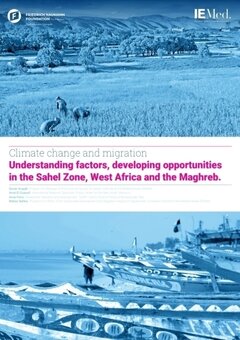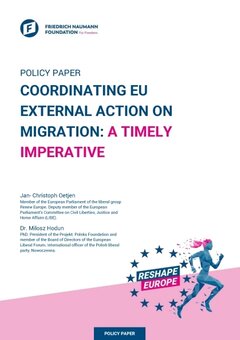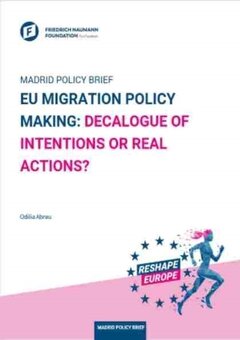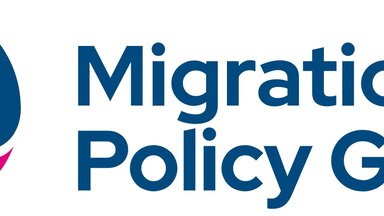About the FNF Madrid Migration Policy Group
The Migration Policy Group coordinates the work of policy makers - including Members of the European Parliament, members of national parliaments, regional and local elected officials - and experts to harmonize proposals and political action addressing migration issues. The unique nature of the group resides in its geographical diversity. The Policy Group’s members come from both Southern Europe – Spain, Italy, Portugal; Eastern Europe – Poland, Hungary, Lithuania, Latvia; and West Africa – Senegal, Morocco, Cote d’Ivoire; and the Middle East. Because of the composition, the Policy Group serves as a much-needed platform of cooperation between different regions allowing reciprocal learning and sensitizing according to the rules of mutually beneficial partnerships. What is worth noting, these processes within the group occur not only on the ‘Southern Europe – Eastern Europe’ line, but also between Europe and Africa, which confirms the originality of the project.
The FNF Madrid Migration Policy Group is also characterized by its wide and exhaustive scope of interest. It covers three fundamental axes of the political analysis of the migration phenomenon: the countries of destination, transit and origin.
The Policy Group members look for solutions how to manage migration so that it maximizes the benefits for and minimizes the negative effects on destination, transit and origin countries, as well as migrants themselves. Such an approach allows to leave the purely Euro-centric perspective, facilitating real dialogue with neighboring countries and regions. Analyzing the issue from the destination countries’ point of view is important but also incomplete and unfair. Including both the countries of transit and origin creates a platform for open discussion that will eventually lead to comprehensive solutions, embodying the ‘more for more’ approach. The latter one could replace the current EU’s relations with third countries based on ‘externalization’ of border control, which leaves migrants and refugees at risk of exploitation, abuse, and violence.
Evidence-based policies of the Policy Group have been drafted during a series of fact-finding missions in regions of origin, transit, and destination.
Visiting programs
Conferences
Publications
-

Climate variations in the regions, climate change as a source of human displacements and as a risk multiplier in human displacement in West Africa, Maghreb and the Sahel region, are the central themes addressed by the publication by FNF Madrid and IEMed “Climate change: understanding factors, developing opportunities in the Sahel Zone, West Africa and the Maghreb”, which will be presented during the event. The project developed together with IEMed explores new perspectives on one of the main drivers on migration flows for the upcoming decades in the region.
-

The Policy Paper “Coordinating EU External Action on Migration: A Timely Imperative” is a joint collaboration of the FNF Madrid office and two members of its Migration Policy Group: Jan- Christoph Oetjen. Member of the European Parliament from the liberal Renew Europe Group and Milosz Hodun, PhD, Member of the Board of Directors of the European Liberal Forum, International officer of the Polish liberal party, Nowoczesna. The Policy Paper sheds a light on the EU Migration Agenda and the challenges that must be addressed in order to achieve an efficient migration management, especially when it comes to EU relations with key third countries. Furthermore, the paper includes the work carried out by the FNF Madrid Migration Policy Group, which is relevant for liberal policy makers and experts.
-

The strengthening of legal pathways and cooperation with third countries are key elements for migration management in the European Union (EU), according to liberal policymakers and researchers. The run-up to the 2024 European elections suggests that the EU will put migration issues at the centre of the debate with a special focus on the Mediterranean region, where the mainland entry points to Europe are concentrated. In this line, we have listened to some members of the Migration Policy Group of FNF Madrid who have shed light on the main challenges related to the migration topic. About the FNF Madrid Migration Policy Group Being aware of the multiple challenges posed by migration management in the Mediterranean region, the Mediterranean Dialogue project of the FNF project office in Madrid launched the Migration Policy Group in 2020. This initiative aims to bring together liberal policymakers and experts in order to harmonize proposals and political action addressing migration issues. FNF Madrid has developed a wide array of activities in order to strengthen the Migration Policy Group as well as to stimulate the exchange of ongoing and upcoming initiatives between the EU and its Mediterranean neighbors.
Documentary Voices in Motion
Voices in Motion Documentary Film Trailer
© FNF MadridVoices in motion is a documentary produced by FNF Madrid and directed by CAD Productions. With this piece, the Friedrich Naumann Foundation wants to bet on a future of equality among young people. Thus, it brings together the stories of different people with a migratory background who are committed to giving value to the societies where they go, to make them more cohesive and enriching. In this case, Barcelona.

